10 Best Accounting Software for Small Businesses
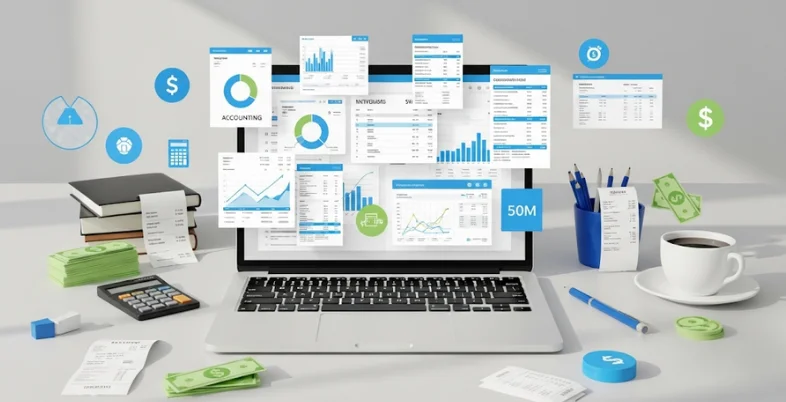
In today’s digital economy, small businesses face more complexity than ever before. They need to track invoices, manage expenses, handle payroll, and prepare taxes. These financial tasks can be time-consuming and prone to mistakes, especially when done manually. As competition increases and regulations become stricter, more small business owners are turning to accounting platform to streamline their operations and increase financial accuracy.
In 2025, accounting software for small businesses is more than just a bookkeeping tool; it is a key part of modern business strategy. With cloud-based systems, automation, and AI-driven features, even the smallest companies can access real-time insights into cash flow, expenses, and profitability. This article looks at why small businesses need accounting platform, what features to consider, the types of platforms available, and how to select the right one for your business.
Why Small Businesses Need Accounting Software
Running a small business often requires owners to manage multiple responsibilities. They handle operations, marketing, customer service, and finances, often without an accounting team. Manual bookkeeping, spreadsheets, and paper receipts can quickly become overwhelming as the business grows.
Accounting software helps small businesses save time, reduce errors, and gain better control over their finances. It automates repetitive tasks like creating invoices, categorizing expenses, calculating taxes, and reconciling bank transactions. It also helps ensure compliance with tax regulations such as GST, VAT, and local payroll laws.
With real-time dashboards and mobile access, accounting platforms allow business owners to monitor their financial health from anywhere. Cloud-based software also makes collaboration with accountants, advisors, or remote teams easier while keeping data secure.
Key Features of Modern Accounting Software
The best accounting software in 2025 includes much more than basic bookkeeping. Small businesses should seek platforms that offer strong functionality, flexibility, and compliance support.
- Invoicing and Payment Collection: Modern platforms enable users to create custom invoices, send them via email or messaging apps, and accept online payments through gateways like Stripe, Razorpay, or PayPal. Some tools even support recurring billing and late payment reminders.
- Expense Tracking: Automatic syncing with bank accounts and credit cards allows for real-time expense recording. Many tools use AI to categorize transactions and create spending summaries, helping businesses manage costs.
- Bank Reconciliation: Instead of matching transactions by hand, the software can import bank feeds and automatically reconcile payments, deposits, and fees. This reduces mistakes and saves a lot of time.
- Tax Compliance: Small businesses benefit from automated reporting for income tax, VAT, and GST. Some platforms can even generate reports ready for audits, pre-fill tax forms, and submit returns to tax portals.
- Inventory and Order Management: Retailers and businesses with physical products should look for tools that provide inventory tracking, purchase order management, batch or barcode tracking, and supplier management.
- Real-Time Reporting and Dashboards: Financial dashboards show cash flow, profit and loss, sales, outstanding receivables, and liabilities in real time, enabling quick decision-making.
- Payroll Integration: Many accounting tools connect with payroll software or have built-in salary processing, handling employee tax deductions, leave management, and payslip creation.
- Multi-User Access and Permissions: Access controls let business owners add team members, accountants, or auditors while maintaining data privacy through user roles and restrictions.
- Integrations: Integrating with ecommerce platforms, CRMs, point-of-sale systems, inventory apps, and payment processors allows businesses to manage all finances from one interface.
Benefits of Accounting Software for Small Businesses
Accounting software provides numerous advantages that contribute to the growth and sustainability of small businesses.
- Improved Accuracy: Automation reduces human error in calculations, categorization, and reconciliation. Most software includes checks to ensure compliance and maintain data integrity.
- Time Savings: Tasks that once took hours, like creating invoices, tracking expenses, or preparing tax reports, can now be completed in minutes.
- Better Cash Flow Control: Features such as automated reminders, real-time dashboards, and cash flow projections help businesses avoid shortfalls and plan effectively.
- Tax Readiness: With built-in tax modules, businesses can calculate and file GST, VAT, or income tax on time, avoiding penalties and audits.
- Scalability: As businesses expand, the software can accommodate more users, locations, currencies, and integrations without disrupting operations.
- Professional Image: Sending well-organized, branded invoices, reports, and statements enhances professionalism and builds client trust.
List of Best Accounting Software for Small Businesses
1. myBillBook
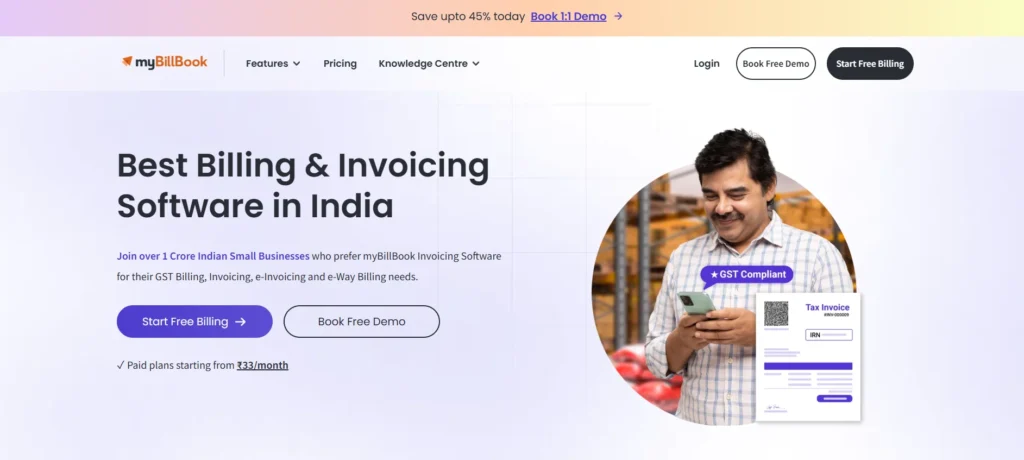
myBillBook is an Indian fintech startup developed by FloBiz, focused on providing small and medium-sized businesses with easy-to-use billing and accounting software. Built specifically for India’s MSME sector, myBillBook supports local business needs including GST billing, inventory tracking, payment reminders, and digital bookkeeping. Designed with simplicity in mind, the platform offers both mobile and desktop access, making it ideal for shop owners, service providers, distributors, and field-based businesses looking for affordable, GST-compliant solutions.
The platform has gained rapid traction due to its regional language support, offline functionality, and ability to generate tax-ready reports in seconds. It helps businesses replace traditional pen-and-paper bookkeeping with smart digital workflows, making it an ideal solution for anyone running a bookkeeping business — even without accounting expertise.. myBillBook is also praised for its invoice customization, barcode-enabled billing, and seamless payment tracking via UPI and mobile wallets.
Features:
- GST-compliant invoicing and billing
- Inventory and stock management
- Payment reminders and UPI collections
- Expense tracking and profit/loss reports
- Multi-user access and role permissions
- Works offline and in regional languages
- Mobile, desktop, and web versions
Pricing:
- Diamond: ₹217/month Pay ₹2599/year. Billed annually
- Platinum: ₹250/month Pay ₹2999/year. Billed annually
- Enterprise: ₹417/month Pay ₹4999/year. Billed annually
2. Zoho Books
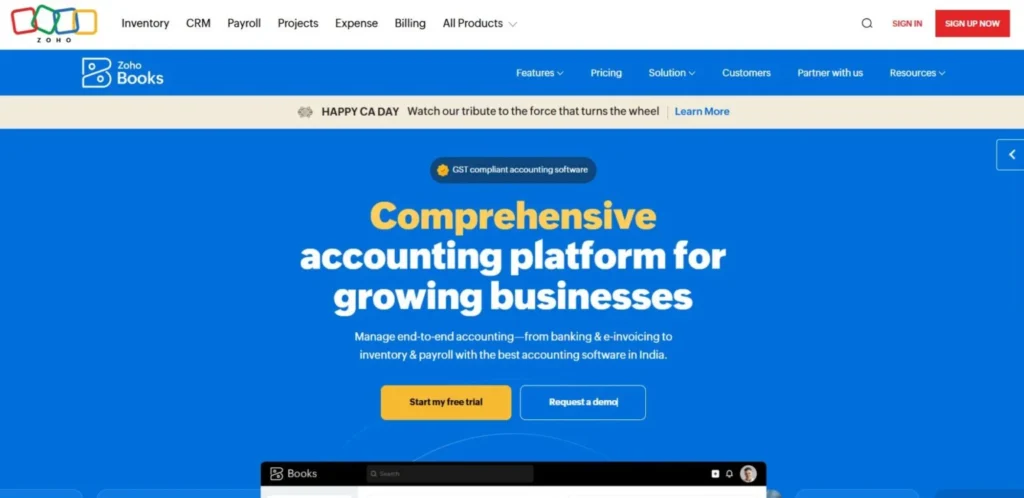
Zoho Corporation is a self-funded tech company known for producing high-quality SaaS products without external investments. It operates in areas like CRM, email, HR, collaboration, and finance tools, serving over 80 million users worldwide. Zoho Books is its dedicated cloud accounting solution aimed at small businesses, particularly in India where GST compliance is essential.
Zoho Books works seamlessly with the broader Zoho ecosystem. It’s perfect for businesses using Zoho CRM, Zoho Inventory, or Zoho Projects. The software features a clean design, automated workflows, GST filing capabilities, and affordable pricing, especially for Indian businesses. With solid mobile support and clear documentation, it’s a great choice for companies focused on growth.
Features:
- GST-compliant invoicing, return filing, and audit trails
- Payment gateway integrations (Razorpay, Stripe, etc.)
- Automated workflows and client approval flows
- Time tracking and retainer billing
- Real-time bank feeds and reconciliation
Pricing (billed annually):
- Free Plan – ₹0/month (for small businesses with turnover under ₹25 lakh)
- Standard – ₹749/month
- Professional – ₹1,499/month
- Premium – ₹2,999/month
- Elite – ₹4,999/month
- Ultimate – ₹7,999/month
- 14-day free trial available
3. FreshBooks
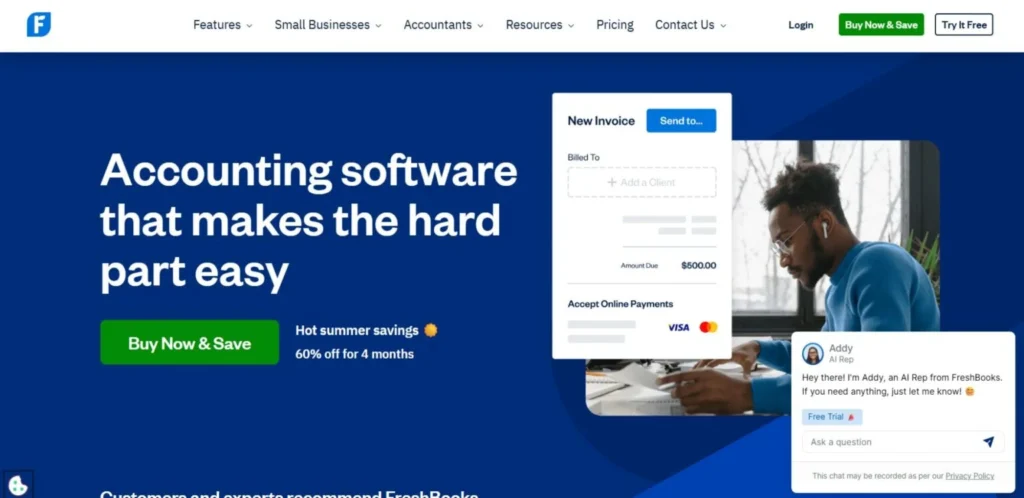
FreshBooks started as an invoicing app for freelancers and quickly grew into a complete cloud accounting platform. Designed for service-oriented professionals, FreshBooks emphasizes simplicity, automation, and collaboration with clients. More than 30 million people in over 160 countries have used the platform, which continues to thrive thanks to its strong mobile capabilities and project-based billing.
The company prioritizes user experience. The platform is intuitive, visually appealing, and avoids overwhelming users with complex accounting terms. Features like proposal management, time tracking, and recurring invoices make it ideal for solo entrepreneurs and teams involved in client projects. FreshBooks also provides strong customer support and integrates easily with apps like G Suite, Trello, and Shopify.
Features:
- Invoicing with automatic late fee reminders
- Time tracking and project billing
- Built-in proposal and estimate creation
- Expense capture with receipt photos
- Mobile apps for iOS and Android
Pricing:
- Lite: $8.40/month
- Plus: $15.20/month
- Premium: $26.00/month
- Select: Custom pricing (Contact sales)
4. Xero
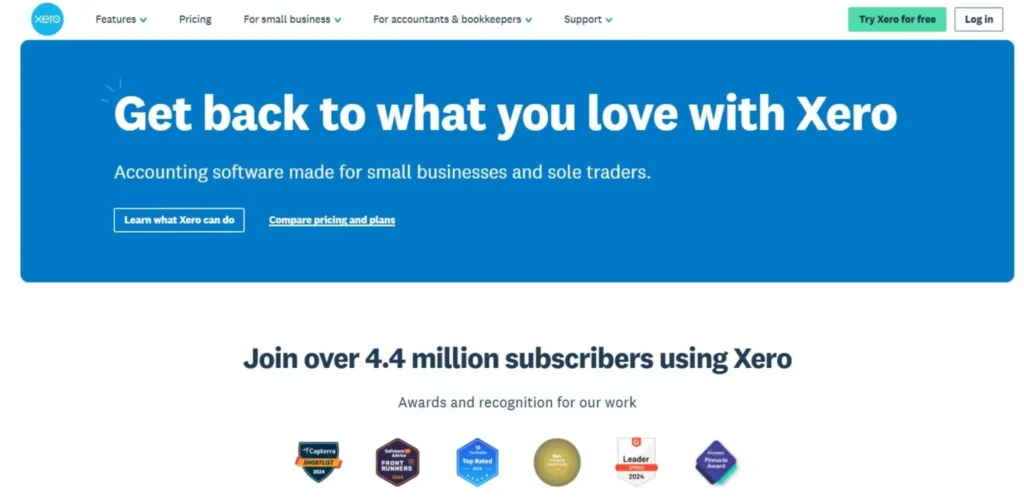
Xero is a cloud-native accounting software that changed the traditional desktop model of business finance. With a global user base of over 3 million subscribers, Xero offers sleek, modern accounting tools trusted by startups, small businesses, and accountants. The company focuses on simplicity and collaboration, providing unlimited user access and real-time updates.
Xero is popular in Australia, New Zealand, the UK, and the US. It integrates with over 1,000 third-party apps and excels at managing multi-currency transactions, payroll, and inventory tracking. With a strong partner network and regular updates, Xero remains a flexible choice for businesses seeking insight, speed, and growth.
Features:
- Real-time cash flow reports
- Bank feeds and smart reconciliation
- Purchase orders, inventory, and bills
- Payroll support in select regions
- 1,000+ integrations (Gusto, Shopify, HubSpot, etc.)
Pricing:
- Starter – $2.90/month (then $29/month)
- Standard – $4.60/month (then $46/month)
- Premium – $6.90/month (then $69/month)
- 30-day free trial available
Also Read: Business Opportunity in India
5. Wave
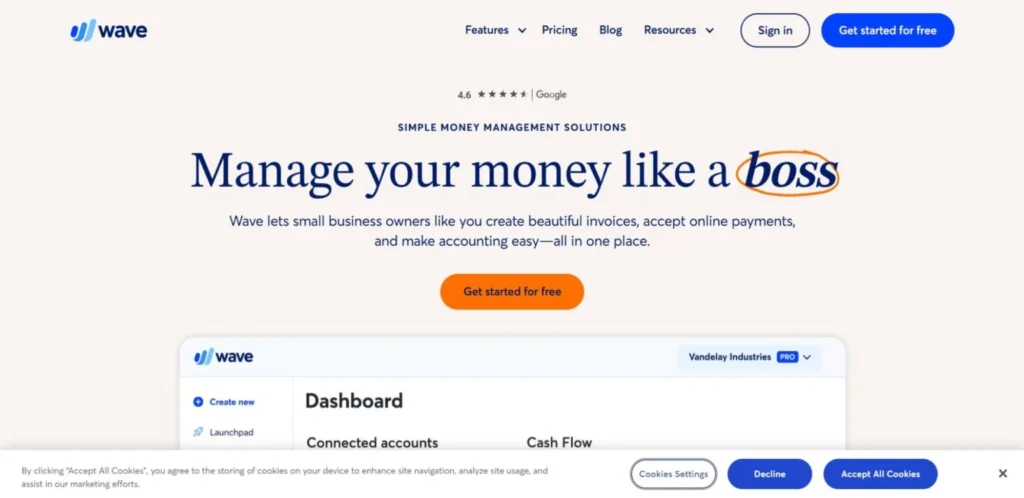
Wave is a unique accounting platform that provides powerful financial tools for free. It’s designed for small businesses, freelancers, and side hustlers, removing cost as a barrier to smart bookkeeping. In 2019, H&R Block acquired Wave, ensuring its stability and enhanced services.
Wave’s goal is to offer professional-level accounting, invoicing, and receipt management without any fees. Users only pay for optional add-ons like payroll or credit card processing. Its interface is clean and user-friendly, making it a favorite for freelancers and consultants needing an easy way to manage finances and invoice clients.
Features:
- Free unlimited invoicing and estimates
- Expense categorization and receipt uploads
- Profit/loss and tax-ready reports
- Automatic bank feeds
- Optional payroll and payment processing
Pricing:
- Starter Plan: $0
- Pro Plan: $170/year
6. TallyPrime
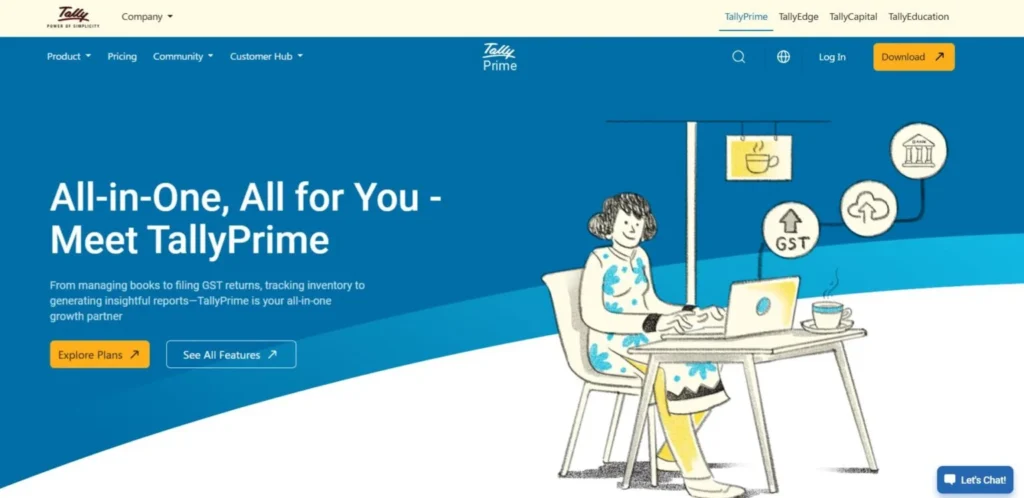
Tally is one of India’s most recognized accounting software brands, known for business accounting for decades. TallyPrime is its modern version, featuring a new UI, remote access, and improved user workflows. Tally has been essential for inventory and financial management in India, particularly for businesses that require robust offline access and compliance.
With features like GST returns, e-invoicing, batch inventory management, and branch-wise accounting, TallyPrime continues to be a top choice for sectors like wholesale, retail, and manufacturing. Its local-first approach, speed, and reliability make it a critical tool for accountants and traditional business owners.
Features:
- GST-ready invoicing and return filing
- E-invoicing and e-way bill generation
- Offline accounting with remote access
- Inventory batch/barcode/Godown management
- Payroll and cost center tracking
Pricing:
- 1 Month: ₹750
- 3 Months: ₹2,138
- 12 Months: ₹8,100
- Lifetime License: ₹22,500
7. Sage Business Cloud Accounting
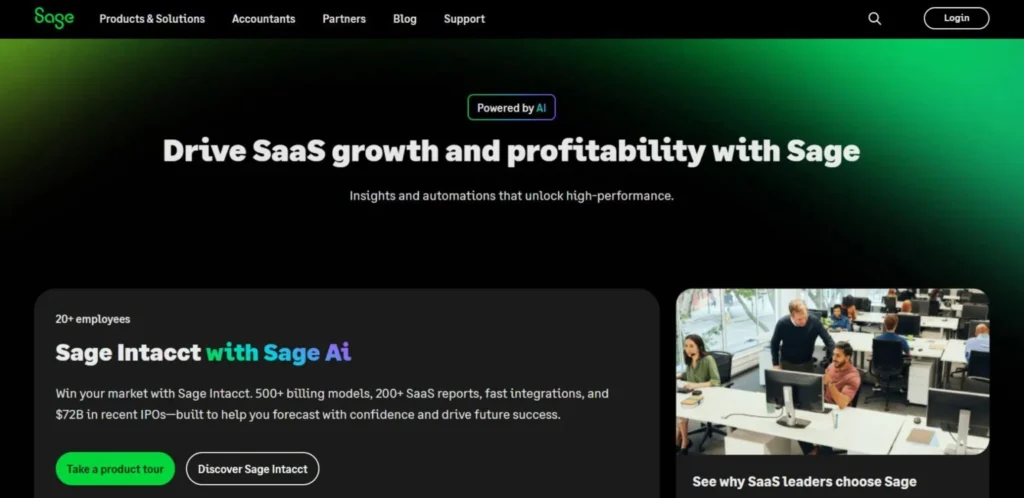
Sage is one of the world’s oldest and most trusted accounting solution providers, serving millions of businesses in over 23 countries. With strong roots in desktop software, Sage has successfully transitioned to the cloud with Sage Business Cloud Accounting, which is designed for smaller businesses requiring solid compliance, tax, and cash flow tracking.
Sage is especially well-regarded in the UK and Europe, where it supports MTD (Making Tax Digital), VAT submissions, and local regulations. It’s known for its scalability and depth in accounting, providing users confidence during audits, reporting, and year-end processes.
Features:
- Real-time bank feeds and reconciliation
- VAT reporting and tax filing
- Invoicing with automated payment reminders
- Cash flow projections and reports
- Multi-user access with roles
Pricing:
- Accounting Start: £18/month
- Accounting Standard: £39/month
- Accounting Plus: £59/month
8. Vyapar
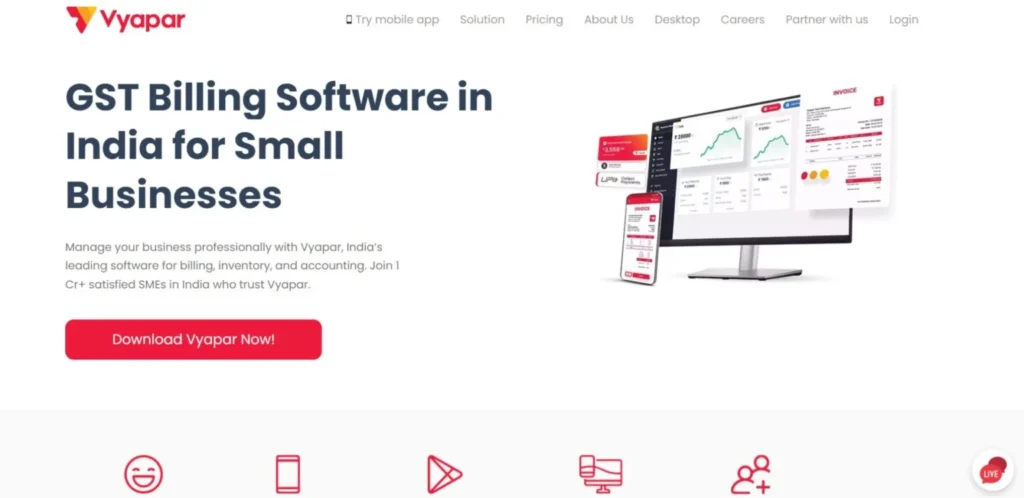
Vyapar is a homegrown accounting and billing solution tailored for Indian micro and small businesses. It helps traditional shopkeepers, traders, and rural business owners digitize their operations with minimal tech skills. Designed for simplicity and GST compliance, Vyapar works offline with optional cloud backups, making it suitable for areas with unreliable internet.
Vyapar stands out for supporting regional languages, WhatsApp sharing, and barcode billing. It helps Indian entrepreneurs run their businesses more efficiently without monthly fees or complicated setups.
Features:
- GST billing and inventory tracking
- Daily sales/purchase reports
- Low-stock and expiry alerts
- WhatsApp invoice sharing
- Works offline with cloud sync
Pricing:
- Silver Plan: ₹3,599.10/year
- Gold Plan: ₹3,869.10/year
- Platinum Plan: ₹9,999/year
9. Busy Accounting Software
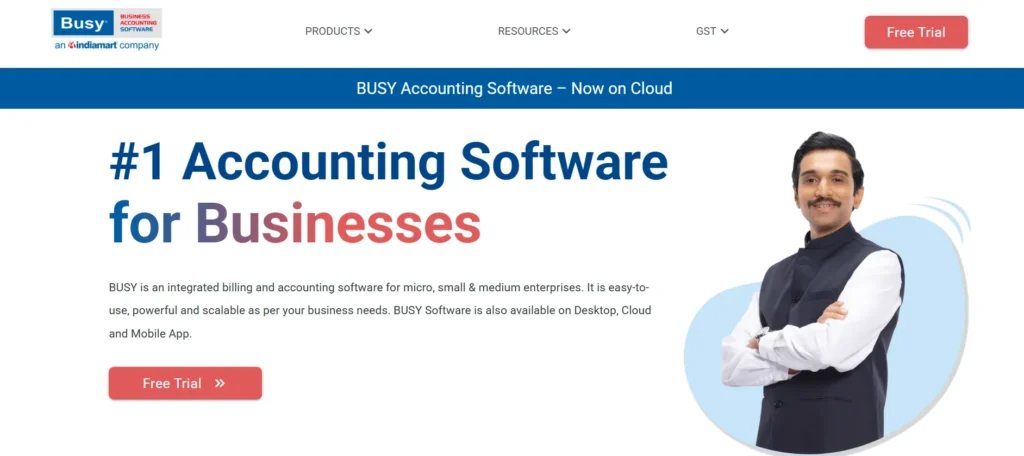
Busy is a strong, inventory-focused accounting platform favored by Indian wholesalers, manufacturers, and trading businesses. It’s known for its sophisticated inventory models, barcode systems, and compliance capabilities, competing with ERP systems while staying affordable.
Busy’s features cover multi-branch management, payroll, GST, and TDS/TCS. It’s well-suited for businesses with complicated stock needs, multi-user environments, or manufacturing processes.
Features:
- Multi-location inventory with barcode
- GST e-invoicing and return filing
- TDS/TCS compliance and payroll
- MIS reports and business summaries
- Supports export documentation
Pricing:
- Starts at ₹9,000 (Basic)
- Advanced versions available with pricing based on modules.
10. Kashoo
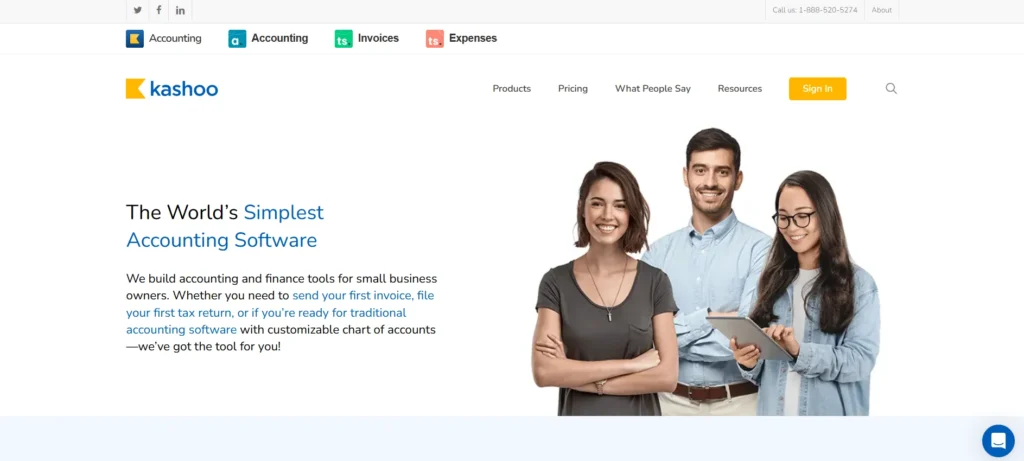
Kashoo is a smart accounting platform designed for freelancers and solopreneurs wanting to simplify their finances while maintaining control. Based in Canada, Kashoo is known for automating repetitive tasks using machine learning, all while keeping its user interface clean and user-friendly.
Its single pricing plan includes all features and unlimited users, making it perfect for small teams. With features like automatic transaction sorting, smart invoicing, and project tracking, Kashoo is ideal for those seeking speed, clarity, and cloud convenience, especially in service industries or international freelancing.
Features:
- AI-powered auto-categorization
- Multi-currency invoicing and payments
- Bank reconciliation and project tracking
- Tax-ready reports and income summaries
- Unlimited users at no extra cost
Pricing:
- Truly small accounting: $216/year
- Kashoo: $324/year
Challenges in Adopting Accounting Software
Despite the benefits, some small businesses may encounter challenges when adopting accounting platform. Recognizing these obstacles can help in planning a smoother transition.
- Learning Curve: Business owners who are not familiar with finance or technology might take time to adjust to new software. Choosing user-friendly platforms with tutorials can make this process easier.
- Integration Gaps: Some tools might not integrate with local payment gateways, tax portals, or industry-specific apps, which can interfere with workflows.
- Localization Issues: International platforms may not support local tax rules, currencies, or languages, making them less suitable for certain regions without extra customization.
- Hidden Costs: Add-ons such as payroll, additional users, advanced reporting, or storage may not be included in the base plan. Always check pricing closely.
- Data Security Concerns: Although cloud platforms offer encryption and backups, businesses need to ensure they comply with data protection laws and utilize features like two-factor authentication and role-based access.
How to Choose the Right Accounting Platform
Selecting the right accounting software is an important decision. Here are key criteria to help small businesses assess their options.
- Identify Business Needs: Start by listing the essential tasks the software must perform. Do you need inventory tracking? Multi-user access? GST filing? Prioritize features based on daily operations.
- Consider Budget and Pricing Model: Compare monthly or annual subscription fees to one-time purchases. Look for hidden costs like training, support, or third-party integrations.
- Check Local Tax and Compliance Support: Ensure the software adheres to your country’s tax regulations, including GST, VAT, TDS, or e-invoicing. For example, in India, this could involve direct GSTR filing and e-way bill generation.
- Evaluate Integrations: Choose platforms that integrate well with other software you already use, like POS systems, CRM, ecommerce platforms, or HR tools.
- Test User Experience: Sign up for a free trial or demo. Assess how intuitive the interface is, how quickly the dashboard loads, and how easy it is to perform basic tasks like creating an invoice.
- Embedded Tax Compliance: Many platforms now feature direct integration with government tax portals, allowing users to submit returns and generate e-invoices without leaving the software.
- Mobile Accounting: Fully functional mobile apps permit users to invoice clients, track expenses, and reconcile transactions from anywhere.
- Focus on Data Privacy and Compliance: As data regulations tighten worldwide, software providers are focusing more on encryption, data residency controls, and audit logs to ensure user security.
Conclusion
In 2025, accounting software for small businesses is essential for the success of every small business. These tools provide a powerful combination of automation, accuracy, and insights that let entrepreneurs focus on growth rather than paperwork.
Whether you operate a retail shop, service business, manufacturing unit, or consulting firm, there is accounting solution available for your needs. The key is to find a solution that fits your processes today and can adapt as your business grows.
By evaluating features, compliance support, usability, pricing, and the company behind the product, business owners can select a platform that not only manages numbers but also supports smarter decision-making. With the right accounting software, small businesses can enhance profitability, ensure transparency, and build a stronger financial foundation for the future.
FAQs
1. What is accounting software, and why do small businesses need it?
Accounting solution is a digital tool that helps businesses manage financial tasks such as invoicing, expense tracking, tax calculation, payroll, and reporting. Small businesses need it to automate bookkeeping, reduce errors, maintain compliance with tax regulations, and gain real-time insights into cash flow and profitability.
2. Which features should small businesses look for in accounting software?
Key features include automated invoicing, expense tracking, real-time reporting, bank reconciliation, tax compliance (e.g., GST, VAT), payroll integration, multi-user access, and compatibility with payment gateways. Cloud access and mobile support are also important for flexibility and remote work.
3. What is the best free accounting platform for small businesses?
Wave is one of the most popular free accounting tools for freelancers and small businesses. It offers invoicing, receipt scanning, expense tracking, and basic reports at no cost. However, additional services like payroll or payments are billed separately.
4. How do I choose the right accounting software for my business?
Start by identifying your specific needs—such as inventory management, tax compliance, or client billing. Consider your budget, team size, industry, and level of accounting knowledge. Always opt for a free trial before making a decision, and ensure the software supports local tax laws and your preferred integrations.
5. Is cloud-based accounting software secure?
Yes, most cloud-based accounting solution providers use advanced security protocols such as end-to-end encryption, two-factor authentication, and data backups. However, businesses should choose reputable providers and enable all available security features.
 Get 50% off on Vault theme. Limited time offer!
Get 50% off on Vault theme. Limited time offer!